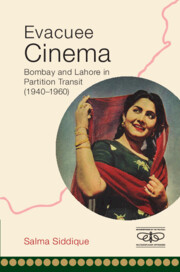Book contents
- Frontmatter
- Dedication
- Contents
- List of Figures
- Acknowledgements
- Introduction: A Moving Picture
- 1 The All-India Ambitions of Lahore
- Part 1 The Secular Stance of Bombay
- Part 2 Between Bombay and Pakistan
- Conclusion: Evacuee Cinema
- Appendix: Three Film Transcripts from the Fazli Family Collection
- Filmography
- Bibliography
- Index
Appendix: Three Film Transcripts from the Fazli Family Collection
Published online by Cambridge University Press: 11 October 2022
- Frontmatter
- Dedication
- Contents
- List of Figures
- Acknowledgements
- Introduction: A Moving Picture
- 1 The All-India Ambitions of Lahore
- Part 1 The Secular Stance of Bombay
- Part 2 Between Bombay and Pakistan
- Conclusion: Evacuee Cinema
- Appendix: Three Film Transcripts from the Fazli Family Collection
- Filmography
- Bibliography
- Index
Summary
With the exception of Shama, none of the pre-partition Fazli films survive. Transcripts of two other films, Ismat and Dil, along with Shama, are available in the Fazli family collection. Using the details available in the surviving ephemera, this appendix will describe the narrative content of the Fazli oeuvre.
Ismat (Purity, 1944; Director: Sibtain Fazli; Cast: Nargis, Nandrekar, Mehtab)
Retailing at five annas as ‘an Islamic, progressive achievement’, the transcript of Ismat was published by a Lahori Gate press. The opening scenario is of a girls’ school assembly where Mohammad Iqbal's popular ‘Child's Prayer’ is being sung. The teacher in charge proceeds to narrate a didactic story of two young women, Ishrat (Mehtab) and Aaliya (Nargis), who receive divergent upbringings. While Aaliya is noble, devoted to her husband and respectful of traditions, Ishrat is spoilt, estranged from her husband, Shafi, and depicted as too ‘Westernised’ for her own good. The lives of the two women cross when Aaliya's husband, Aslam, meets with a car accident with Ishrat behind the wheels and loses his memory. Ishrat brings him to her house to recuperate, and an arrangement of restitution transforms into a romantic attachment. Meanwhile, the noble and suffering Aaliya sets out to win back her husband. Finally, Aslam regains his mind and returns to his wife, whose prayers and good conduct have kept her in good stead. A chastened Ishrat becomes a teacher in a girls’ school and is the narrator of this moral lesson for girls.
In the first half of the published script, these lives unfold in parallel, offering the pleasures of contrast, where considerations of modesty, marital and filial obligations, and class govern daily life. The primary opposition in the narrative is between Islamic and Western value systems, with the former vindicated and upheld. The story starts off with two weddings. In the first, the officiating minister solicits the bride's consent. Modestly unresponsive, the veiled bride, Aaliya, murmurs a faintly audible assent, or a hunh, on being coaxed by her spirited girlfriends. Meanwhile, at the other wedding, the minister refuses to proceed, as the bride does not observe purdah. Her comically insouciant family quickly fabricates a screen to hasten the ceremony. The minister is further outraged when the recalcitrant bride, Ishrat, utters an emphatic and English ‘yes’ and dismisses his request for a more modest consent.
- Type
- Chapter
- Information
- Evacuee CinemaBombay and Lahore in Partition Transit, 1940–1960, pp. 230 - 236Publisher: Cambridge University PressPrint publication year: 2023



